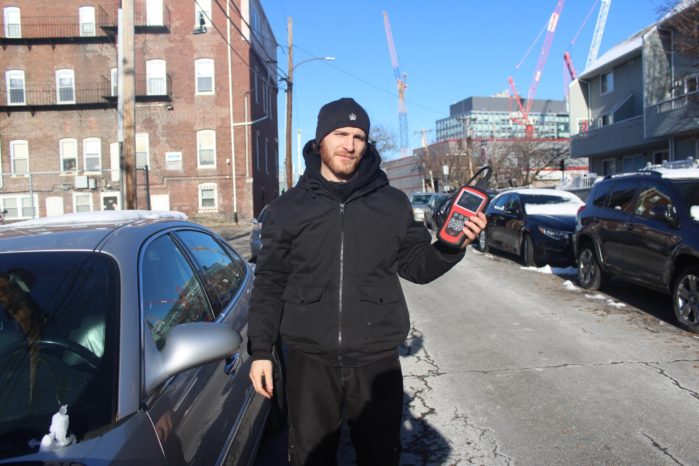
As it turns out, the future is far more advanced than anything that can connect with my Buick.
Scene I: The Commish
“I’ve closely reviewed Question 1, Right to Repair. Question 1 clearly states that repair shops can access only your car’s mechanical data. It’s written right here in the bill.”
Ed Davis, former Boston Police Department commissioner and current pitch man for the Yes on 1 campaign, stands in front of a nondescript house with gray and white siding and an equally anonymous auto. He’s just trying to help you out here, so listen up.
“There would be no access to any personal data. That’s a dishonest attack by the big automakers who want a monopoly on car repairs.”
The former Hub commish has been ringing this bell for months and advocating for the right of independent auto mechanics to access the increasingly sophisticated and wireless computers that make most vehicles tick these days. In addition to these television spots, which are largely paid for by O’Reilly Auto Parts, AutoZone, and Advance Auto Parts, he’s lit up airwaves and newspapers as well.
For the performances and other consulting services, the Massachusetts Right to Repair Committee has paid Davis $75,000 to push Yes on 1 since last winter, according to the Office of Campaign and Political Finance.
“I know a little bit about this business, and I also know a fear campaign,” Davis told MetroWest Daily News. Referring to the No on 1 opposition, he added, “When I drive down Route 93 and I see billboards with menacing-looking people with hoodies talking about your security, that’s inappropriate for what we’re having here.”

Scene II: The Mechanic
Stephen Pokornicki is a model vehicle repairman out of Waltham. Over the past 10 years, he’s built his business through social media and word of mouth; these days, he’s using all of the above to school laypeople about what it is that the gods of grease really do. Because while there are still messes made and dungaree onesies are sporadically worn, mechanics will tell you that they are technical stewards as well, wielding devices that scan vehicles to pinpoint problems.
“We rely on these the way a carpenter relies on a hammer.” Pokornicki plugs his Autel scanner, an essential generic telematic code reader that almost every auto repair worker uses, into an outlet in my Buick LaCrosse that I had no idea was there. He continues, “Say the engine misfires, or there hasn’t been a tune-up in a wicked long time, or excess wear and tear takes its toll; these scanners read service info not found in the owner’s manual.”
Right now, guys like Pokornicki access data through a car’s onboard diagnostic port and can only view this information while my silver money pit is parked and plugged in. But the future is wireless data, and therein lies the main concern for small-shop mechanics like Pokornicki.
Back when former BPD Commissioner Ed Davis started stalking you through your flatscreen months ago, this all may have sounded familiar. That’s because it is. And to understand the current debate, it helps to throw it in reverse.
Scene III: The Loophole
Cover your eyes with your face mask for a second, and remember eight years ago, hard as that may be. Gangnam Style, Pussy Riot, President Barack Obama, challenger Mitt Romney.
In Massachusetts, voters approved the use of medical marijuana, rejected a ballot measure that would have allowed for assisted death (Death With Dignity), and in the same election overwhelmingly approved (87.7%) a ballot question that “required automobile manufacturers to provide non-proprietary diagnostic directly to consumers and also the safety information needed to repair their cars.”
In short, that’s how Pokornicki got his handy scanner. The 2012 Right to Repair initiative was largely considered a victory for the little guy and for residents who sought more options for repair shops. And that’s how things have mostly evolved—so far.
As it turns out, the future is far more advanced than anything that can connect with my Buick. Telematic wireless scanners, which can already read data in many large commercial vehicles like heavy-duty trucks, are the apparent next big thing. And you guessed it—the 2012 measure doesn’t cover the cloud. Auto manufacturers can block wireless access to vehicles, including critical real-time data sent to and from a car via telematics. For diagnosing and repairing problems in a lot of newer cars and trucks, access to this information is essential.
According to Massachusetts Right to Repair Coalition Director Tommy Hickey, “This loophole excludes telematics wireless systems in 90% of the 2020 models.”
“That means [dealers] have a delivery system of info, and they will set the market. Dealerships are 30% more expensive. When you hide behind tech you create excuses and red tape. It’s only going to get worse. Nothing makes them share that data.”
“If we aren’t allowed to use wireless tech, this [Autel] device might as well be a wheel chock,” Pokornicki said.
There are roughly 3,000 repair shops in Mass, about 1,700 independently owned. Without an update to the existing Right to Repair bill to force manufacturers to share telematics data, many indie shop owners say that they eventually won’t be able to perform routine quick fixes or navigate more nodulous quagmires.
The opposition, of course, argues otherwise.
To date, each side’s deep-pocketed donors have given more than $20 million.
Scene IV: The Garage
Groceries in hand, a frightened woman looks over her shoulder. She’s in a parking garage. A menacing dude in a hood lurks behind her. You know where this is going.
Did he use her auto data like a homing beacon? Manipulate telematics to disable her car?
And hold on to your dipsticks: “Civil rights groups also opposed the California [Right to Repair] proposal due to concerns about racism and redlining.”
In another spot by the Coalition for Safe and Secure Data, the No on 1 set, a woman arrives at her quaint suburban home, but all is not well. The narrator proclaims that federal officials foresee the pairing of home addresses and garage door codes, much to the delight of the despicable. A third ad featuring a fully facemasked hacker out of central casting flies even further over the top and begs the question: Is there any chance this ominous black hat could be former BPD Commissioner Ed Davis in disguise, double-dipping on both sides of the ballot measure?
Nah, way too tiny.
Scene V: The No
“I think it’s like knocking on Coca-Cola’s door and saying: ‘Hey. I am a little cola place down the street, my cola isn’t selling that well, what’s the formula to Coca-Cola? Give it to me.’ And it’s not right!”
That’s what legacy regional car king Ernie Boch Jr. told WBUR back in 2010, at the dawn of the Right to Repair fight in Mass. Always the poet, Boch continued.
“We don’t call them mechanics. They’re technicians. They’re like surgeons. I mean, this is extremely complicated, this is not about willy-nilly giving out information and having every Tom, Dick, and Harry working on it.”
Boch Jr. has since divested from many of his auto holdings, while the Coalition for Safe and Secure Data, a lobbying organization funded by groups like the Alliance of Automobile Manufactures and the Association of Global Automakers, have moved on from his losing strategy of dumping on independent mechanics. Instead, this time around, the opponents of Right to Repair are arguing that there is no need for the measure—“[independent repair shops] have all the same software diagnostics and service manuals that the dealerships have.” The CSSD’s official line: “Automakers collect data from the vehicle to improve product designs, monitor for safety recall concerns, and provide consumers with requested services, like turn-by-turn navigation, or automatic emergency 911 services after a crash. Information relating to the repair of a vehicle is accessible and it has been for many years now.”
Advocates for the Right to Repair reject that assessment, claiming that manufacturers are already bypassing independent repair shops and will inevitably increase the number and frequency of wireless transactions moving forward. They’ve also had to respond to a barrage of accusatory short horror film previews that CSSD has run to make suburbanites soil themselves: “They will know which coffee shop you stop at each morning, the routes you take to avoid rush hour, how often you go to your gym, and how fast you drive to pick up your kids on time. They will know which neighborhoods you drive in, and what time of day.”
“It won’t do anything to improve the consumer experience, but it will add tremendous risk for everyone,” Conor Yunits, spokesman for the Coalition for Safe and Secure Data, told Boston 25. “When you lower the bar to access these systems, wirelessly, you are opening a lock, and opening a door for hacking that cannot be shut again. The more people that have access to information, the more risk there is of doing harm.”

Scene VI: The Farmers
Small-scale whip refitters are not alone in their struggle against bigs. Starting roughly 10 years ago, John Deere began to flatten many of its farming faithful by preventing tractor owners from performing their own repairs, or allowing anyone else to work on equipment besides authorized agents.
The squeeze has tightened. In California, decision makers at a farmer lobbying group were accused by members of coddling the tractor king against their own better interests. As farmers have (in some cases literally) delivered Right to Repair proposals to lawmakers in 20 states, John Deere has only doubled down, citing familiar security concerns. The company’s director of business development told Bloomberg, “One tweak could cascade throughout an entire software system and lead to unintended consequences.”
Forecasting the looming trend across industries, in 2018 Karl Bode of Techdirt eloquently noted: “Whether coming from Apple, Sony, or Microsoft, opposition to these [Right to Repair] bills usually focuses on the three (false) ideas: the bills will make users less safe, somehow ‘compromise’ intellectual property, and open the door to cybersecurity theft.”
Bode added: “Much of the current right to repair fracas began with the lowly tractor. More specifically, it started when John Deere decided to ban anything but ‘unauthorized repairs,’ inadvertently turning countless ordinary citizens into technology policy activists. A lengthy EULA the company required customers to sign back in 2016 forbids the lion’s share of repair or modification of tractors customers thought they owned, simultaneously banning these consumers from suing over “crop loss, lost profits, loss of goodwill, loss of use of equipment … arising from the performance or non-performance of any aspect of the software.”
All precedents considered, you can count on countless interests from in as well as out of state watching the Commonwealth closely to see how Question 1 unfolds.
Scene VII: The Spectators
As technology watchers and experts explain it, interest in the Right to Repair in its various forms will only increase as the discussion migrates to digital consumer devices. Regardless of what happens in Mass, the road ahead is bound to open up in some states, which could pave the way for any number of opportunity puns.
Specifically, the 20 states that are considering new legislation around repairs are largely focused on farm equipment, but the potential implications are nevertheless significant. Even under the watch of a president who’d ban Americans from plunging their own toilets if a plumber bought a MAGA hat, a Mar-a-Lago membership, and a PDF diploma from Trump University, there has been recognition of the issue at the national level. Last summer, the Federal Trade Commission hosted an event called Nixing the Fix: A Workshop on Repair Restrictions, checking under the hood for ways “manufacturers may limit third-party repairs by consumers and repair shops and whether those limitations affect consumer protection, including consumers’ rights under the Magnuson-Moss Warranty Act,” which makes it illegal for manufacturers or dealers to deny coverage under a warranty just because someone other than the dealer performed repairs.
One of the material documents submitted for the FTC’s consideration was titled “A Look at Statistics and Trends of Repair Services in the Healthcare Industry.” Offered by the Green Engineering Technologies for the Community of Tomorrow Research Lab University at SUNY Buffalo, the report recommended “a fair competition between manufacturers and third-party repair service providers and the need for having access to critical service information, service parts and repair tools to ensure covering the repair services demand of medical devices in a safe, cost-effective, and timely manner.”
When it comes to the latest battle between small repair shops and their Big Auto-Part allies in the Massachusetts theater of the war against Big Auto, it’s up to voters to decide what’s fair when it comes to the future of wireless data access.
Nate is a Boston-based reporter who has written for the Boston Phoenix, the Boston Metro, and DigBoston among other publications.

